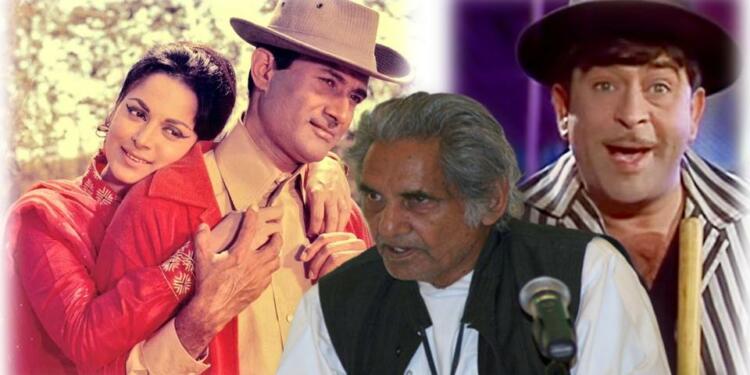Gopaldas Neeraj Biography: Many times, the finiteness of language fails to grasp the boundless emotions. This shortcoming of language often causes the loss of the essence or the magnanimity of any event. But then there are certain people who are blessed by Maa Saraswati. They transcend these limitations. With their unfathomable imagination they infuse new life in the already existing words and strike the right emotional chords.
Gopaldas Neeraj was one such blessed individual who graced the Hindi literature and Entertainment industry with his timeless creations.
Resolute on Principles
Gopal Das Saxena was born on January 4, 1925, in Etawah, Uttar Pradesh. He was well versed in both Hindi and Urdu. But he was an ardent supporter and promoter of the Hindi language. To comprehend his love for Hindi, let’s understand the scenario that was prevalent at the time.
In the mid-20th century, taking an Urdu pen name was both a cool trend and gave higher possibility of recognition and even unworthy admiration. Evidently, the elites, prominent personalities and media persons showered love and admiration on Sahir Ludhianvi and Hasrat Jaipuri. The extensive coverage, reportage and the mad frenzy of media created an aura around such poets, writers and ‘Shayars’ which continues till date.
However, trampling the urge for immediate success or accepting the crutches of Urdu pen name, Gopal Das Saxena made his love for Hindi as his own identity. Gopaldas adopted a pen name “Neeraj” for a conscious association with Goddess of Knowledge and Art, Maa Saraswati. But the story doesn’t end there.
Also read: From Devas to Bollywood, How the Definition of Hero Changed
Attempts to shut his voice
There were several occasions when he had to go through a lot of trouble for his conscious choice of adopting a Hindi pen name. He was unfairly vilified and had his character assassinated for standing out of the league.
With his impressive writing skills, he soon became a well acclaimed face at Kavi Sammelan. Due to his busy schedule, he would often miss his lecturing duties. His haters often exploited these opportunities and spread canards about him.
Apparently, during his lecturer days at Meerut College, the college administration accused him of not taking classes and even character assassinated him. Deeply hurt by the baseless charges and personal hits, he resigned from the job.
Also read: Neeraj Pandey – The shining diamond in the heap of coal that is Bollywood
The imaginative flight from poetry to lyricist
Gopaldas Neeraj wrote many poems and worked immensely to strengthen and propagate Hindi literature. Apart from writing, he was a Professor of Hindi Literature at Dharma Samaj College, Aligarh.
But mostly, he was the superstar of Kavi Sammelan. Impressed by his Kavi Sammelans, his student Ram Chandra persuaded him to write songs for the Hindi film industry. Later, he moved to Mumbai. In 1966, he got his first chance and wrote the songs for the movie “Nai Umar Ki Nai Fasal.” Songs such as “Karwan Guzar Gaya Gubar Dekhte Rahe” and “Dekhti Hi Raho Aaj Darpan” became instant hits.
Once the “Evergreen Superstar,” Dev Anand, persuaded Neeraj to accompany him to the residence of the legendary music director and singer SD Burman. To test his skills, temperament, and command over the art, SD Burman narrated a brief scenario and challenged Neeraj to write a song. However, he was not allowed to use easy words like Madira, Jam, Sarab, Sabab, and others to describe the scene of an intoxicated girl. Acing the challenge, Gopaldas Neeraj wrote the iconic song “Rangeela Re,” which is a superhit till date.
Also read: OTT players say No to Direct Release to Bollywood Movies on their Platforms
The success story continued, and he wrote songs for famous films like “Mera Naam Joker,” “Sharmilee,” and “Prem Pujari,” among others. His songs “Ae bhai zara dekh ke chalo,” “Likhe jo khat tujhe,” and “Bas yahi apradh ek baar karta hoon” are still immensely loved.
Gopaldas Neeraj was bestowed Padma Shri and Padma Vibhushan for his immense contribution to Hindi literature and timeless work in the Hindi film industry.
It is unfortunate that this legendary lyricist didn’t get the respect he deserved. There is hardly any material on his great contribution to cinema. Further, there are many relentless campaigns that malign his legacy and try to paint him as a drunkard.
Support TFI:
Support us to strengthen the ‘Right’ ideology of cultural nationalism by purchasing the best quality garments from TFI-STORE.COM



























